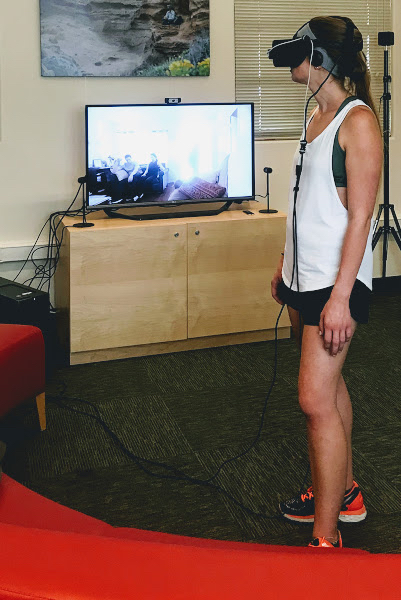 May 26, 2020 — When CSU Channel Islands (CSUCI) went virtual in response to the COVID-19 pandemic, the Nursing program had one of the biggest challenges on campus. The faculty needed to create virtual clinical labs for its students.
May 26, 2020 — When CSU Channel Islands (CSUCI) went virtual in response to the COVID-19 pandemic, the Nursing program had one of the biggest challenges on campus. The faculty needed to create virtual clinical labs for its students.
“Nursing programs require a certain number of hours of clinical experience in order to meet state requirements,” said Associate Professor of Nursing Jaime Hannans, Ph.D., R.N., C.N.E. “We have clinical courses in which students engage in patient-to-student experiences at a hospital, or other healthcare facility. We had to rethink how to deliver hand-on educational experiences virtually.”
Innovation from Hannans and Assistant Professor of Nursing Colleen Nevins, D.N.P., R.N., C.N.E. has garnered them a $10,000 Mini-grant from the CSU Chancellor’s Office for their proposal, called “Nursing Faculty Support and Development of Online/Virtual Clinical Labs.”
Hannans and Nevins propose to coordinate across the CSU Nursing programs to determine what has been done during the online transition this past semester, develop templates for clinical lab, and develop faculty support for the future. Online or virtual classes and labs are likely to be necessary for the future owing to the ongoing pandemic, fire season, and other emergency situations. The grant work creates a solution for those situations.
This is the second Innovation Mini-grant received by CSUCI as the grant program enters its fourth year. The grant program is administered by Cal State Innovate, situated in Information Technology Services (ITS) in the Chancellor’s Office, with the goal of fostering innovative projects in emerging technologies at campuses. This year, there was a focus on business and instructional continuity in the call for proposals.
“CSUCI is a leader in the CSU with so many innovations in teaching and learning,” said CSU Office of the Chancellor Director for Innovation/Information Technology Services’ Kate Miffitt. “The proposed project is a novel solution to a real world problem nursing faculty and students are facing as instruction takes place online. With healthcare being so critical in the current situation, supporting nursing students across the CSU to graduate and join the workforce is such an important priority.”
 One of the most exciting developments for Nevins and Hannans was figuring out a solution to the immersive virtual reality experiences they introduced into the program. Students would wear a virtual reality headset to enable them to embody a patient to understand what it was like to have Alzheimer’s, macular degeneration, etc. The COVID-19 pandemic placed a barrier to facilitating that experience.
One of the most exciting developments for Nevins and Hannans was figuring out a solution to the immersive virtual reality experiences they introduced into the program. Students would wear a virtual reality headset to enable them to embody a patient to understand what it was like to have Alzheimer’s, macular degeneration, etc. The COVID-19 pandemic placed a barrier to facilitating that experience.
“Nobody wants to put on a virtual reality headset right now and then hand it off to somebody else,” Hannans said. “We are working with Embodied Labs piloting something called ‘group distributed mode’ in which I put on the virtual reality headset and screen share the virtual experience with students.”
Nevins and Hannans’ work with virtual education has been highlighted a number of times, including a mention on LinkedIn by Embodied Labs, a company that specializes in designing virtual experiences that can be used in health care settings.
Both Nursing professors anticipated the growth of virtual reality and mixed reality learning in nursing, but neither anticipated the explosive growth of virtual learning necessitated by the pandemic.
“It helps push nursing forward to explore possibilities using virtual technology,” Hannans said. “We were kind of moving at a slow and steady turtle’s pace, but this definitely pushed us into the rabbit pace.”
To read the LinkedIn reference, visit: https://www.linkedin.com/posts/embodiedlabs_distance-learning-with-csu-channel-islands-activity-6666732629972389888-EZpu/.
